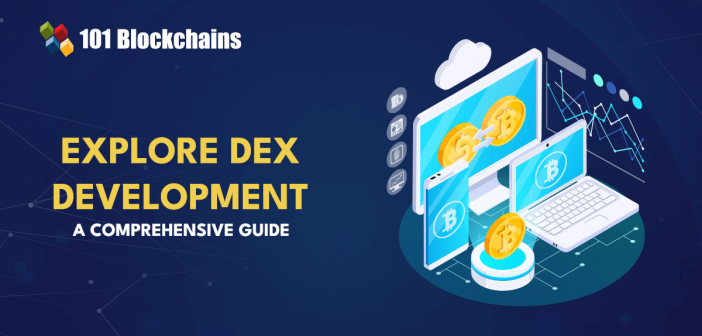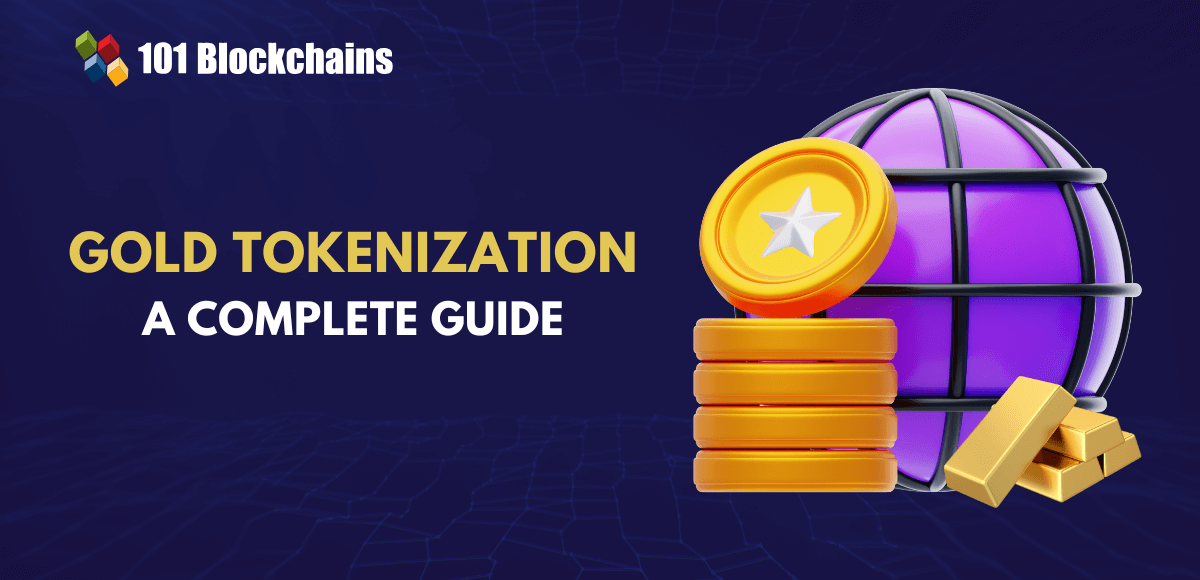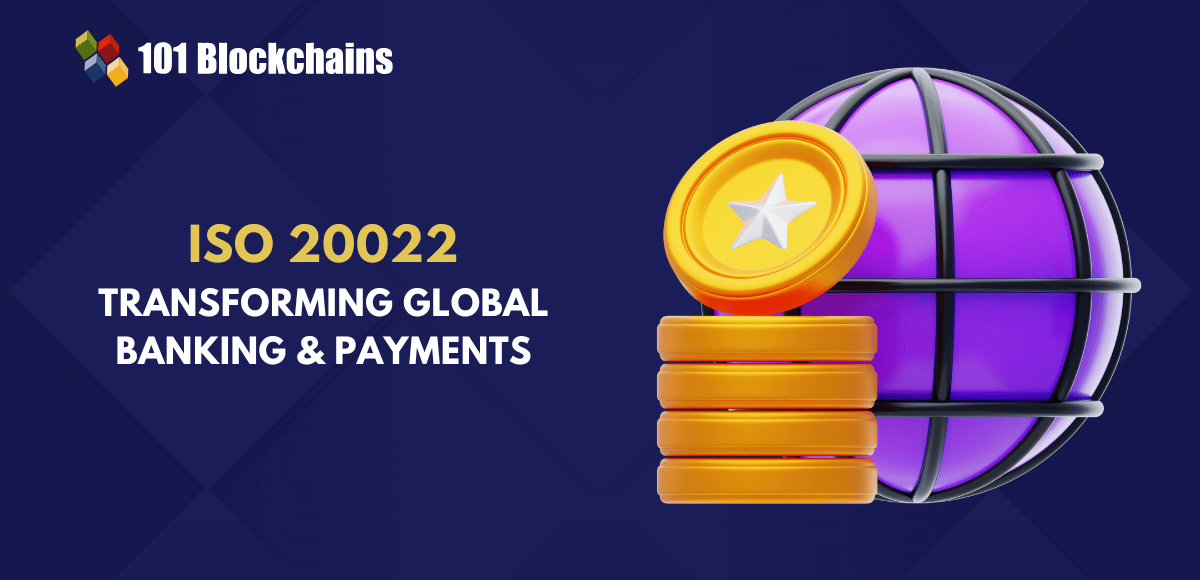Learn how blockchain truly works, master key definitions, and uncover what makes smart contracts so "smart." Dive into the fundamentals, gain valuable insights, and start your blockchain journey today!

- Guides
James Howell
- on May 31, 2024
Decentralized Exchanges (DEX) Development: A Comprehensive Overview
Decentralized Exchanges or DEXs have emerged as the most powerful platforms in the web3 ecosystem with enhancements over traditional exchanges. DEXs have provided a new perspective on the approaches we follow to trade digital assets. As compared to the traditional centralized exchanges, decentralized exchanges work without central authorities. Therefore, decentralized exchange development guide brings additional advantages to users such as improved control over assets, enhanced privacy and better security. Decentralized exchanges are one of the formidable elements in the continuously evolving web3 ecosystem. As a matter of fact, the daily trading volume on DEXs in October 2023 surpassed $1.3 billion. Over 209 million users performed financial transactions on decentralized exchanges, with Uniswap being the largest in the pack. Let us find how to build a decentralized exchange like Uniswap with insights into important requirements for creating DEXs.
Understanding Decentralized Exchanges and Their Working
Decentralized exchanges or DEXs differ from centralized exchanges, such as Binance or Coinbase, which serve as intermediaries or centralized authority in different operations. The understanding of DEX fundamentals is essential in a decentralized exchange development guide as it can help you find explanation for its importance. Users deposit assets in centralized exchanges which look for matching buy and sell orders to conduct transactions. As a result, centralized exchanges gain control of user funds in every transaction.
On the other hand, decentralized exchanges such as SushiSwap and Uniswap follow a completely different approach. For example, DEXs use smart contracts to enable token swaps and users can connect their crypto wallets directly to these exchanges for direct trade with other users. At the same time, it is also important to note that DEXs also bring some challenges alongside the benefits of decentralization. For example, users would come across concerns of limited liquidity for less popular tokens. On the other hand, DEXs have become popular additions to the web3 ecosystem for offering better security and enhanced user control in the cryptocurrency ecosystem.
Learn about the working mechanisms and advantages of smart contracts with Blockchains Fundamentals Free Course.
Why Have DEXs Gained Momentum?
Decentralized exchanges have gained momentum in the web3 ecosystem for diverse reasons. The popularity of decentralized exchange software and protocols can be attributed to the setbacks with centralized exchanges. Cryptocurrency exchanges gained attention worldwide for offering flexible means to interact with cryptocurrencies. Within no time, centralized crypto exchanges became one of the most popular and commonly used tools in web3. Big players in the domain of cryptocurrency exchanges gained unprecedented growth in popularity albeit with significant challenges. For example, cryptocurrency exchanges became increasingly vulnerable to social engineering attacks and emerged as popular sites for promoting rug and pull scams.
Examples of the downfall of popular centralized crypto exchanges such as FTX prove that decentralized exchange development guide is an essential requirement. The collapse of FTX crypto exchange in 2022 not only provided a reason to create DEX exchange but also showed that DEXs can revolutionize accessibility of cryptocurrencies. Decentralized exchanges offer better security and transparency with special emphasis on privacy and safety of user data and assets.
Excited to know the use cases of crypto in NFTs, DeFi, and the metaverse, Enroll now in the Cryptocurrency Fundamentals Course
Why Should You Develop a Decentralized Exchange?
The setbacks with centralized cryptocurrency exchanges serve as the ideal reasons to build a decentralized exchange with features to address the limitations of centralized exchanges. You can notice the following factors as the best reasons to encourage businesses to build their own decentralized exchange. Here are some of the most prominent reasons for which you should develop decentralized exchanges.
-
Global Reach
One of the foremost reasons to invest your efforts and resources in building a decentralized exchange is accessibility. DEXs change the conventional definitions of accessibility to crypto exchanges by ensuring 24/7 availability. Decentralized exchanges attract a diverse range of investors and traders who can access the platforms round-the-clock with a stable internet connection. If you study the example of decentralized exchange, you are likely to come across multiple token pairs, which can address the needs of experienced traders as well as beginners. Decentralized exchanges also offer the assurance of better global reach with the flexibility for managing cross-border transactions.
-
Preparedness for the Future
The continuous expansion of the web3 and blockchain ecosystem also presents another convincing reason to pursue DEX development projects. Businesses can stay on top of latest developments and trends in web3 to exhibit readiness for the future by creating their own decentralized exchanges.
-
Community
Another important highlight that separates DEXs from other crypto exchanges is the assurance of community development. The examples of successful decentralized exchanges shows that they can develop strong communities of crypto token holders and users. The communities can serve as a valuable asset for businesses developing DEXs as they can support the introduction of new projects.
-
Better Profits
Businesses should also seek answers for “How to build a DEX exchange?” as DEXs can open new opportunities for revenue. DEXs can rely on trading fees as the primary source of income, which are derived from the shares of transaction amount paid by users for transactions on the platform. On top of it, decentralized exchanges also charge token listing fees that can help businesses earn revenue. The fees are applicable for cryptocurrency projects which want to list their tokens on the decentralized exchange.
In some cases where DEX has its own DAO, users can participate in the governance process of the DEX. Therefore, it can open revenue generation streams through sales of governance tokens. In addition, DEXs can also look for opportunities to collaborate with other web3 projects and raise money from advertising. Businesses can also opt for addition of premium features as another method of generating profits from new decentralized exchanges. For example, DEXs can ensure monetization of services through advanced trading analytics alongside customization options such as personalized alerts and dashboards.
-
Assurance of Transparency
The list of advantages of decentralized exchange development guide for businesses also focuses on transparency. DEX transactions are documented on blockchain networks and users have the flexibility for fair and secure verification of all operations on the platform. The assurance of better transparency helps in encouraging trust alongside improving the possibilities for repeated use of decentralized exchanges.
Build your identity as a certified blockchain expert with 101 Blockchains’ Blockchain Certifications designed to provide enhanced career prospects.
Do You Need a Completely Decentralized or Semi-Decentralized DEX?
Businesses searching for prospects to build a decentralized exchange must think about the two prominent variants of DEXs. You can find two primary variants of DEXs, depending on the extent of decentralization. Completely decentralized and semi-decentralized DEXs are different from each other in the extent of control over user assets and transactions.
In the case of completely decentralized DEXs, you would find that there are no central authorities or intermediaries running operations. Users have complete control over their assets and private keys. Upon initiation of a trade, it is conducted directly between users by leveraging smart contracts. With the assurance of decentralization, completely decentralized DEXs can improve privacy and security.
On the other hand, semi-decentralized DEXs bring a different angle to example of decentralized exchange functionalities. Semi-decentralized exchanges facilitate an effective balance between user experience and decentralization. You can find features similar to centralized exchanges on these DEXs, such as order matching. However, semi-decentralized exchanges also provide complete control to users over their assets. Semi-decentralized exchanges work with the combination of on-chain and off-chain elements, which are tailored for achieving desired speed and efficiency, alongside delivering the essential security benefits.
What are the Important Components of a Decentralized Exchange?
Decentralized crypto exchanges are a valuable resource in the web3 ecosystem with a broad range of advantages. However, creating a decentralized exchange software involves emphasis on the balance between user experience, security and trustless environments. At the same time, each trait presents unique challenges in the process of developing DEXs. Therefore, it is important to rely on continuous innovation and adaptability to new trends and requirements. It is also important to note that DEXs evolve continuously with developers working on addressing the challenges with user experience, security and trust.
How can you identify the important components for your DEX? In such cases, you can rely on examples of popular DEXs, such as Uniswap, and their architecture to identify components. Here is an outline of the most important components you need to develop decentralized exchanges.
-
Smart Contracts
Every decentralized exchange development guide showcases the importance of smart contracts in developing DEXs. Smart contracts serve as the driving force behind DEXs and support the management of crypto assets without centralized intermediaries. Uniswap works by using a collection of immutable smart contracts which ensures safety of contract logic against malicious manipulation.
Curious to understand the complete smart contract development lifecycle? Enroll now in the Smart Contracts Development Course!
-
Liquidity Pools
Another important component of DEXs are liquidity pools, which allow users to deposit their crypto assets in return for earning interest. Contribution of more assets to the pools helps in improving their liquidity. Users who deposit their tokens in liquidity pools, or liquidity providers, can receive a portion of the trading fees generated by the DEX as rewards for facilitating liquidity.
-
Wallets
Wallets are also an important requirement when you create DEX exchange and you can choose different types of wallets according to your choice. Uniswap offers compatibility with a broad range of wallets, such as Metamask and its native Uniswap wallet.
-
Security Mechanisms
If you want to have a successful DEX, then you must incorporate safety mechanisms to protect your DEX against security threats and smart contract vulnerabilities. For example, smart contract audits by third-party vendors can help in identifying potential vulnerabilities in the code before it goes live.
-
Operating Mechanism
The most crucial highlight in the answers for “How to build a DEX exchange?” also draw the limelight on operating mechanism or the mechanism used in a DEX for matching orders. While you can opt for on-chain order books and off-chain order registers, the ideal choice of order matching mechanism is Automated Market Maker or AMM systems.
Steps for Developing the Decentralized Exchange
With clarity on what you should build to get the best results from a decentralized exchange, you must explore the steps that can help you create a DEX. Here are some of the recommended steps to develop your decentralized exchange.
-
Establish Your Business Goals
You can begin a DEX development project only after establishing your business goals and what you want to achieve with the DEX. At this stage, you must define the monetization strategy, features, target audience and type of assets for the DEX.
-
Select a Blockchain Network
Ethereum might appear as the obvious choice for developing a decentralized exchange. However, you can explore new alternatives such as Solana and Polygon to capitalize on advantages of cost-efficiency and speed.
Excited to learn about the fundamentals of Solana and Solana smart contracts development, Enroll now in the Solana Development Course.
-
Choose the Order Matching Mechanism
The most important requirement to build a decentralized exchange is the order matching mechanism. You can opt for Automated Market Makers or order books, according to your preferences and objectives.
-
Smart Contract Development
You have to develop smart contracts for managing the trading process. In addition, you must also create smart contracts for calculation and distribution of trading fees and rewards. It is important to emphasize security above everything else in the smart contract development process.
-
UI/UX Design
Another crucial step in the process of creating decentralized exchanges is UI/UX design. You must develop decentralized exchange software which helps users discover the important functions without any conflicts.
-
Compliance
DEX developers must also pay attention to compliance with legal regulations for cryptocurrencies and related financial services. It is also important to check for licensing and registration requirements for DEXs to operate in specific jurisdictions.
-
Prioritize Security
Take any example of decentralized exchange which has tasted success and you would notice how they prioritize security above all. You should also implement strong security measures for your DEX to ensure safeguards for user assets. For example, encryption of sensitive user data and interactions or regular security audits of the DEX architecture.
Create new, high-level, innovative blockchain solutions for different industries as a highly-skilled blockchain developer with Blockchain Developer Career Path.
Final Words
The utility of decentralized exchanges serves a new benchmark for usability and decentralization in the web3 ecosystem. With DEXs, users can enjoy unprecedented levels of freedom regarding all actions with their assets. The insights covered in this decentralized exchange development guide offer a general impression of what you need to create DEXs. On the other hand, you have to dip your hands in practical decentralized exchange development projects to find out what’s working and what’s not. Learn from the experts and navigate each step in the roadmap to build your own decentralized exchange right now.
*Disclaimer: The article should not be taken as, and is not intended to provide any investment advice. Claims made in this article do not constitute investment advice and should not be taken as such. 101 Blockchains shall not be responsible for any loss sustained by any person who relies on this article. Do your own research!







